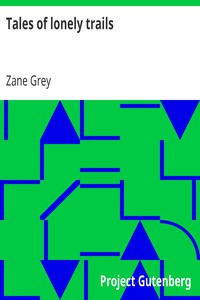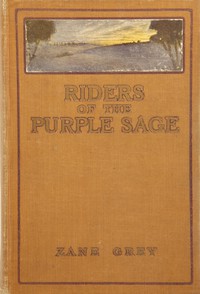Tales of lonely trails by Zane Grey (best e book reader android .txt) 📖

- Author: Zane Grey
Book online «Tales of lonely trails by Zane Grey (best e book reader android .txt) 📖». Author Zane Grey
All told then we had a rather nondescript and poor pack of hounds; and the fact discouraged me. I wanted to hunt the bad cinnamons and the grizzly sheep-killers, with which this rim-rock country was infested. I had nothing against the acorn-eating brown or black bears. And with this pack of hounds I doubted that we could hold one of the vicious fighting species. But there was now nothing to do but try. No one could tell. We might kill a big grizzly. And the fact that the chances were against us perhaps made for more determined effort. I regretted, however, that I had not secured a pack of trained hounds somewhere.
Frost was late this fall. The acorns had hardly ripened, the leaves had scarcely colored; and really good bear hunting seemed weeks off. A storm and then a cold snap would help matters wonderfully, and for these we hoped. Indeed the weather had not settled; hardly a day had been free of clouds. But despite conditions we decided to start in bear hunting every other day, feeling that at least we could train the pack, and get them and ourselves in better shape for a favorable time when it arrived.
Accordingly next day we sallied forth for Horton Thicket, and I went down with Edd and George. It was a fine day, sunny and windy at intervals. The new trail the boys had made was boggy. From above Horton Thicket looked dark, green, verdant, with scarcely any touch of autumn colors; from below, once in it, all seemed a darker green, cool and damp. Water lay in all low places. The creek roared bankfull of clear water.
The new trail led up and down over dark red rich earth, through thickets of jack-pine and maple, and then across long slopes of manzanita and juniper, mescal and oak. Junipers were not fruitful this year as they were last, only a few having clusters of lavender-colored berries. The manzanita brush appeared exceptionally beautiful with its vivid contrasts of crimson and green leaves, orange-colored berries, and smooth, shiny bark of a chocolate red. The mescal consisted of round patches of cactus with spear-shaped leaves, low on the ground, with a long dead stalk standing or broken down. This stalk grows fresh every spring, when it is laden with beautiful yellow blossoms. The honey from the flowers of mescal and mesquite is the best to be obtained in this country of innumerable bees.
Presently the hounds opened up on some kind of a trail and they worked on it around under the ledges toward the next canyon, called See Canyon. After a while the country grew so rough that fast riding was impossible; the thickets tore and clutched at us until they finally stopped the horses. We got off. Edd climbed to a ridge-top. "Pack gone way round," he called. "I'll walk. Take my horse back." I decided to let George take my horse also, and I hurried to catch up with Edd.
Following that long-legged Arizonian on foot was almost as strenuous as keeping him in sight on horseback. I managed it. We climbed steep slopes and the farther we climbed the thicker grew the brush. Often we would halt to listen for hounds, at which welcome intervals I endeavored to catch my breath. We kept the hounds in hearing, which fact incited us to renewed endeavors. At length we got into a belt of live-oak and scrub-pine brush, almost as difficult to penetrate as manzanita, and here we had to bend and crawl. Bear and deer tracks led everywhere. Small stones and large stones had been lifted and displaced by bears searching for grubs. These slopes were dry; we found no water at the heads of ravines, yet the red earth was rich in bearded, tufted grass, yellow daisies and purple asters, and a wan blue flower. We climbed and climbed, until my back began to give me trouble. "Reckon we—bit off—a big hunk," remarked Edd once, and I thought he referred to the endless steep and brushy slopes. By and bye the hounds came back to us one by one, all footsore and weary. Manifestly the bear had outrun them. Our best prospect then was to climb on to the rim and strike across the forest to camp.
I noticed that tired as I was I had less trouble to keep up with Edd. His boots wore very slippery on grass and pine-needles, so that he might have been trying to climb on ice. I had nails in my boots and they caught hold. Hotter and wetter I grew until I had a burning sensation all over. My legs and arms ached; the rifle weighed a ton; my feet seemed to take hold of the ground and stick. We could not go straight up owing to the nature of that jumble of broken cliffs and matted scrub forests. For hours we toiled onward, upward, downward, and then upward. Only through such experience could I have gained an adequate knowledge of the roughness and vastness of this rim-rock country.
At last we arrived at the base of the gray leaning crags, and there, on a long slide of weathered rock the hounds jumped a bear. I saw the dust he raised, as he piled into the thicket below the slide. What a wild clamor from the hounds! We got out on the rocky slope where we could see and kept sharp eyes roving, but the bear went straight down hill. Amazing indeed was it the way the hounds drew away from us. In a few moments they were at the foot of the slopes, tearing back over the course we had been so many hours in coming. Then we set out to get on the rim, so as to follow along it, and keep track of the chase. Edd distanced me on the rocks. I had to stop often. My breast labored and I could scarcely breathe. I sweat so freely that my rifle stock was wet. My hardest battle was in fighting a tendency to utter weariness and disgust. My old poignant feelings about my physical condition returned to vex me. As a matter of fact I had already that very day accomplished a climb not at all easy for the Arizonian, and I should have been happy. But I had not been used to a lame back. When I reached the rim I fell there, and lay there a few moments, until I could get up. Then I followed along after Edd whose yells to the hounds I heard, and overtook him upon the point of a promontory. Far below the hounds were baying. "They're chasin' him all right," declared Edd, grimly. "He's headin' for low country. I think Sue stopped him once. But the rest of the pack are behind."
I had never been on the point of this promontory. Grand indeed was the panorama. Under me yawned a dark-green, smoky-canyoned, rippling basin of timber and red rocks leading away to the mountain ranges of the Four Peaks and Mazatzals. Westward, toward the yellowing sunset stood out long escarpments for miles, and long sloping lines of black ridges, leading down to the basin where there seemed to be a ripple of the earth, a vast upset region of canyon and ridge, wild and lonely and dark.
I did not get to see the sunset from that wonderful point, a matter I regretted. We were far from camp, and Edd was not sure of a bee-line during daylight, let alone after dark. Deep in the forest the sunset gold and red burned on grass and leaf. The aspens took most of the color. Swift-flying wisps of cloud turned pink, and low along the western horizon of the forest the light seemed golden and blue.
I was almost exhausted, and by the time we reached camp, just at dark, I was wholly exhausted. My voice had sunk to a whisper, a fact that occasioned R.C. some concern until I could explain. Undoubtedly this was the hardest day's work I had done since my lion hunting with Buffalo Jones. It did not surprise me that next day I had to forget my crosscut saw exercise.
Late that afternoon the hounds came straggling into camp, lame and starved. Sue was the last one in, arriving at supper-time.
Another day found me still sore, but able to ride, and R.C. and I went off into the woods in search of any kind of adventure. This day was cloudy and threatening, with spells of sunshine. We saw two bull elk, a cow and a calf. The bulls appeared remarkably agile for so heavy an animal. Neither of these, however, were of such magnificent proportions as the one R.C. and I had stalked the first day out. A few minutes later we scared out three more cows and three yearlings. I dismounted just for fun, and sighted my rifle at four of them. Next we came to a canyon where beaver had cut aspen trees. These animals must have chisel-like teeth. They left chippings somewhat similar to those cut by an axe. Aspen bark was their winter food. In this particular spot we could not find a dam or slide. When we rode down into Turkey Canyon, however, we found a place where beavers had dammed the brook. Many aspens were fresh cut, one at least two feet thick, and all the small branches had been cut off and dragged to the water, where I could find no further trace of them. The grass was matted down, and on the bare bits of ground showed beaver tracks.


Game appeared to be scarce. Haught had told us that deer, turkey and bear had all gone to feed on the mast (fallen acorns); and if we could locate the mast we would find the game. He said he had once seen a herd of several hundred deer migrating from one section of country to another. Apparently this was to find new feeding grounds.

While we were resting under a spruce I espied a white-breasted, blue-headed, gray-backed little bird at work on a pine tree. He walked head first down the bark, pecking here and there. I saw a moth or a winged insect fly off the tree, and then another. Then I saw several more fly away. The bird was feeding on winged insects that lived in the





Comments (0)